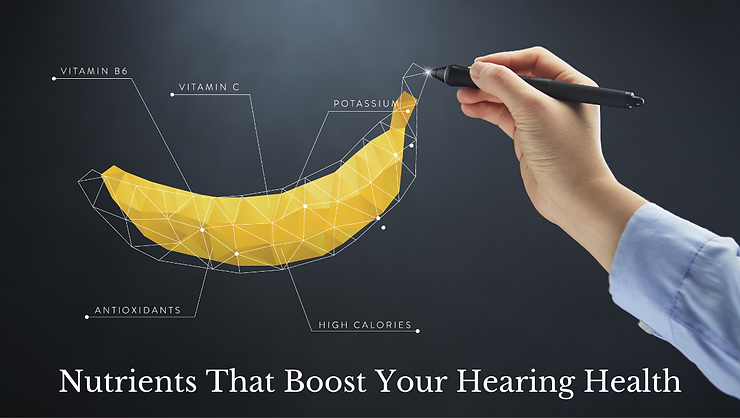
Healthy Hearing with a Healthy Diet
There are many factors that can contribute to disabling hearing loss. Excessively loud noise, especially for an extended period of time, head injury, genetics, to name a few. More and more research is finding that a poor diet can also be added to that list. However, your diet can also help your hearing health.
Your hearing health is directly affected by the food you eat. So, eating foods rich in vitamins and that promote healthy blood flow, you can work toward not only healthy hearing, but also better overall health. Check with your audiologist or other hearing health care professional about healthy eating habits that can benefit your hearing health.
B-9, also known as Folate
The American Journal of Clinical Nutrition published a study from 1999 that found that elderly women suffering from hearing loss had 43 percent lower serum folate levels than their counterparts with normal hearing. A study from 2003 in Acta Oto-Laryngologica showed significantly lower folate levels in patients with sensorineural hearing loss than those with normal hearing. Yet another, from Auris Nasus Larynx in 2004, found that males with age-related hearing loss had very low levels of vitamin B-9. This was an exciting find in the scientific community because it helped establish a connection between vitamin B-9 and hearing loss.
Make sure you are getting enough vitamin B-9 in your diet with foods like spinach, asparagus, beans, broccoli, eggs, liver and nuts. You may also choose to supplement your current diet with vitamins.
B-12
Low levels of B-12 have been associated with sensorineural hearing loss and presbycusis, or age-related hearing loss. It is believed that both B-9 and B-12 deficiencies can cause homocysteine levels to rise and, in turn, restrict blood flow to the cochlea. The cochlea is part of the inner ear that converts sound into electrical signals that travel to the brain. So, get some B-12 in your diet!
Vitamin B-12 is present in foods like meat, eggs, fish, milk, and other dairy products. Supplements are recommended for vegetarians.
Omega-3 Fatty Acids
One of the most important nutritional allies for hearing health is omega-3 fatty acid. A study from 2010 published in the American Journal of Clinical Nutrition found that participants who had at least two servings per week of cold-water fish high in omega-3s, had a 42 percent lower risk of developing age-related hearing loss than those who had less than one serving per week.
In addition to wild-caught salmon, other foods high in omega-3 fatty acids include sardines, pasteurized eggs walnuts, flaxseed, and grass-fed beef and lamb. And yes, omega-3 fish oil supplements are available as well.
Vitamin A, Vitamin E
A study to examine the correlation between dietary and supplement intakes of antioxidants, and the prevalence of hearing loss was conducted over five years. Vitamins A and E stood out in regard to hearing health. Participants with the highest intake of dietary vitamin A had an astounding 47 percent reduced risk of hearing loss, while those who ate foods rich in vitamin E showed a14 percent lowered risk of hearing loss.
Some foods high in vitamin E include almonds, spinach, sweet potato, avocado, sunflower seeds, and olive oil. Foods rich in vitamin A include beef, liver, carrots, sweet potato, kale, spinach, broccoli, eggs and grass-fed butter.
Vitamin C to the Rescue
Vitamin C works with other cellular antioxidants and glutathione to collect free radicals associated with noise-induced hearing loss. Studies with guinea pigs show that including healthy amounts of vitamin C protects the auditory brainstem from damage, especially when excessive noise is present. Vitamin C benefits human hearing by reducing the level of reactive oxygen metabolites produced in the inner ear.
Thankfully, vitamin C is easy to add to your diet. You likely consume many of the following foods daily, if not several times a week: citrus fruits, strawberries, bell peppers, broccoli, Brussels sprouts, and dark leafy greens. If you are afraid you may not be getting enough vitamin C from your diet, find a good vitamin C supplement and enjoy the benefits of healthier living—and hearing!
